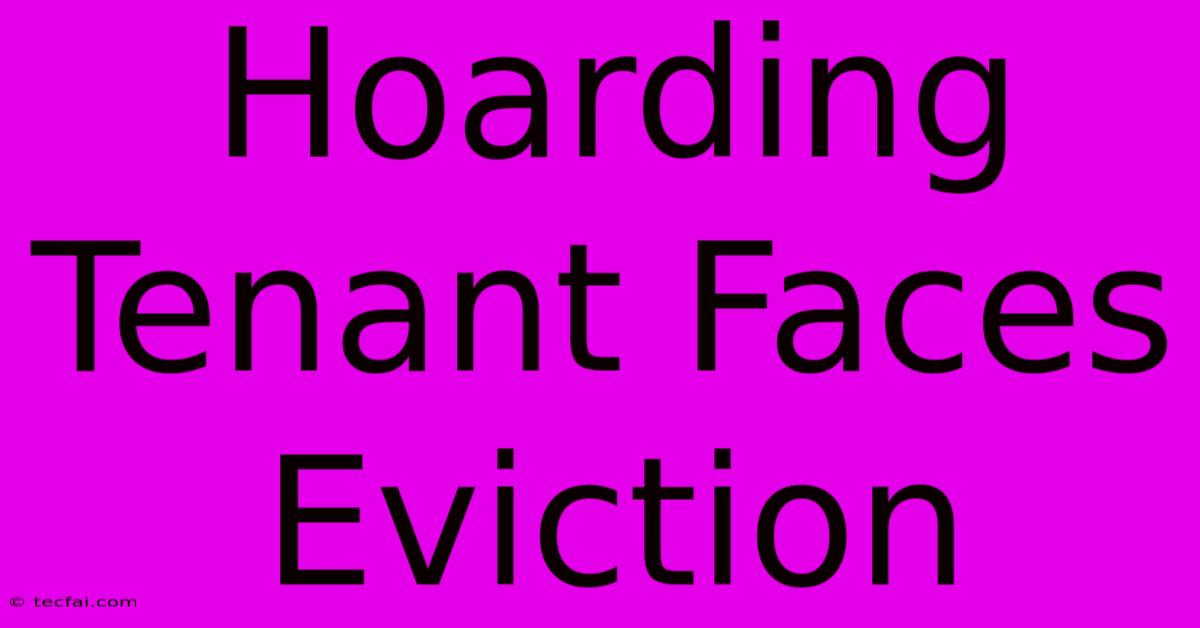Hoarding Tenant Faces Eviction

Discover more detailed and exciting information on our website. Click the link below to start your adventure: Visit Best Website tecfai.com. Don't miss out!
Table of Contents
Hoarding Tenant Faces Eviction: A Landlord's Legal Tightrope
Landlords face a complex and often emotionally charged situation when dealing with a tenant who hoards. It's a delicate balance between upholding property rights and respecting the tenant's privacy and potential mental health challenges. Eviction is a last resort, but sometimes a necessary one. This article explores the legal and ethical considerations involved in evicting a hoarding tenant.
Understanding Hoarding: Beyond Clutter
Before diving into legal actions, it's crucial to understand hoarding isn't simply messy living. It's a recognized mental health disorder characterized by persistent difficulty discarding possessions, regardless of their actual value. This compulsive behavior can lead to unsanitary conditions, fire hazards, and structural damage to the rental property. Recognizing this distinction is vital in navigating the legal and ethical aspects of the situation.
Recognizing the Signs of Hoarding:
- Extreme clutter: Rooms becoming inaccessible, walkways blocked.
- Unsafe conditions: Fire hazards due to blocked exits or overloaded electrical circuits.
- Pests: Rodents or insects thriving in unsanitary conditions.
- Strong odors: A pervasive smell of mildew, decay, or other unpleasant scents.
- Health concerns: Mold, mildew, and unsanitary conditions posing health risks.
Legal Pathways to Eviction: Navigating the Process
Evicting a hoarding tenant requires careful adherence to the law. Jumping straight to eviction without following proper procedures can result in legal repercussions for the landlord.
Document Everything:
- Thorough documentation: Maintain a detailed record of all communication with the tenant, including emails, letters, and photos or videos documenting the hoarding conditions. This forms a crucial part of your legal defense.
- Notice to Cure or Quit: This is typically the first step, providing the tenant with a specified timeframe to address the issues. The time allowed must comply with your local and state laws. Clearly outline the specific violations of the lease agreement.
- Detailed Inventory of Damages: If property damage exists due to hoarding, create a comprehensive inventory and estimate of repair costs. This will be necessary if you pursue financial compensation.
Working with Local Authorities:
- Health Department: Contact your local health department to inspect the property and determine if health violations exist. Their findings can provide crucial evidence in court.
- Fire Department: If fire hazards are present, involve the fire department for an inspection and potential remediation. Their report strengthens your case significantly.
- Social Services: Consider contacting social services to offer the tenant assistance. This demonstrates a good-faith effort to resolve the situation outside of court, though it's not legally mandated.
The Eviction Process:
The specifics of the eviction process vary by jurisdiction. It typically involves filing a lawsuit, serving the tenant with legal notice, and appearing in court. Legal counsel is strongly advised throughout this process.
Ethical Considerations: Balancing Rights and Responsibilities
While the legal process is paramount, ethical considerations must also guide a landlord's actions. Remember that hoarding is often a symptom of a deeper underlying mental health issue.
- Compassionate Communication: While enforcing your legal rights, approach the situation with empathy and understanding.
- Offering Resources: If possible and appropriate, provide information about resources for hoarding disorder treatment. This demonstrates a commitment to resolving the situation humanely.
- Seeking Legal Counsel: Professional legal representation is essential to ensure you navigate the legal process correctly and protect your rights while minimizing potential legal pitfalls.
Preventing Future Hoarding Issues: Proactive Measures
Proactive steps can help mitigate the risk of future hoarding issues:
- Thorough Tenant Screening: Conduct detailed background checks and consider including specific questions about past tenancy issues in your application process.
- Clear Lease Agreement: Ensure your lease explicitly addresses cleanliness and maintenance of the property.
- Regular Inspections: Perform regular inspections of the property according to local regulations and your lease agreement. Early detection can help prevent the situation from escalating.
Evicting a hoarding tenant is a complex undertaking with significant legal and ethical implications. Careful documentation, adherence to legal procedures, and a compassionate approach are crucial in navigating this difficult situation successfully. Remember to always seek legal counsel to ensure compliance with local laws and to protect your interests as a landlord.

Thank you for visiting our website wich cover about Hoarding Tenant Faces Eviction. We hope the information provided has been useful to you. Feel free to contact us if you have any questions or need further assistance. See you next time and dont miss to bookmark.
Featured Posts
-
Phukets Opal Suchata 3rd Runner Up
Nov 19, 2024
-
Fan Fury Attack On Wrexham Owners
Nov 19, 2024
-
Mga Bulatet Seahorse Isang Pagtuklas
Nov 19, 2024
-
Pakistans Low Score 117 In T20 Final
Nov 19, 2024
-
Shreveport Storm Threat Monday
Nov 19, 2024
